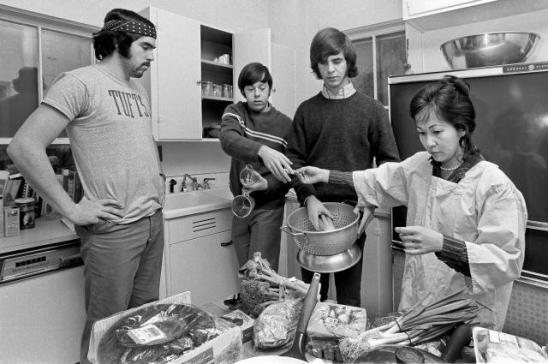History
The oldest organization of its kind in the United States, the Experimental College is no longer an "experiment." Yet our commitment to keeping Tufts an exciting place to learn and teach remains as strong as ever. The ExCollege has been continually evolving since 1964:
1964 – After three years of planning and politicking – led by Tufts President Nils Wessell – the trustees approve an A&S Faculty recommendation to create an Experimental College. Students are invited to sit on the Board, making it the first ever university community to include students.
1966 – Faculty approve – after much lobbying by supportive faculty, students, and President Wessell – full voting status for students on the ExCollege Board.
1967 – The Freshman Seminar program offers the first for-credit, peer-taught courses in university history. It is the precursor to the Freshman Exploration program, which adds an advising dimension and begins in 1972.
1968 – Joanne Ross, a high-school graduate and veteran community organizer offers the first Visiting Lecturer taught course in the Experimental Course, "Urban Poverty." It is an overwhelming success and initiates an important direction for the future of the ExCollege's curriculum.
1973 – A recent Tufts graduate, Marty Blatt, offers a course in the ExCollege called "Zionism Reconsidered." The controversy that gets stirred up generates a heated campus debate about the rights and responsibilities associated with academic freedom.
1979 – The A&S Faculty grant the ExCollege a permanent charter.
1985 – A movement spearheaded by the ExCollege to improve intellectual life on campus culminates in the formation of EPIIC (Education for Public Inquiry and International Citizenship). The first in a series of annual symposia is held in April of that year. The subject is terrorism.
1988 – In response to the overwhelming demand for space in the Explorations program, the ExCollege creates Perspectives, a second advising/seminar program for entering students. In distinction to Explorations, Perspectives will gather all of its seminars under an "umbrella" topic: the movies as art and industry.
1996 – The Communications and Media Studies program (housed in the ExCollege since its inception in 1980) is granted interdisciplinary minor status. Overnight it becomes the largest minor on campus.
2000 – The new millennium sees the founding of TuftsMediaLab, the Experimental College's center for digital film production.
2008 – ExCollege moves to its own house at 95 Talbot Avenue
2014 – The ExCollege celebrates its 50th anniversary
2022 – The Explorations Peer Teaching program celebrates 50 years.
2024 – The ExCollege celebrates its 60th anniversary
